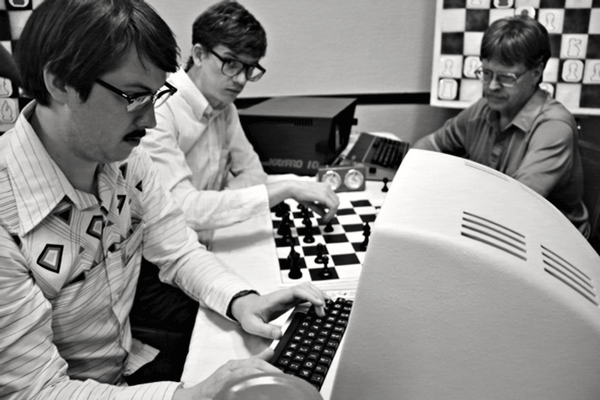
Wiley Wiggins as Martin Beuscher and Patrick Riester as Peter Bishton, in “Computer Chess.”
When man and machine face off, audience wins
BY SEAN EGAN | A film about a computer based chess tournament certainly doesn’t seem to be particularly cinematic or entertaining in theory — but somehow Andrew Bujalski’s latest directorial effort takes this premise and turns it into something memorable and highly engaging. “In some ways, the fantasy of making this movie was born of frustration with trying to figure out how to crack the market, and how to produce things that were quote-unquote ‘accessible,’” says Bujalski, the critically acclaimed director of indie films such as “Funny Ha Ha” and “Beeswax.” “And when I got tired of thinking of doing that, I would retreat off into my fantasy, going ‘Well what’s the least commercially viable thing I could do?’ ” The film that resulted from this train of thought is “Computer Chess” — which is one of the strangest, smartest and best films of the year thus far.
Though “Computer Chess” bears many similarities to Bujalski’s past directorial efforts — particularly in its distinctive, naturalistic performances and dialogue and its understated, homemade vibe — it also marks a significant departure for the director in many ways. While his other films mainly focused on the small scale, personal trials and tribulations of modern twentysomethings, “Computer Chess” is a period piece. Set in the early 1980s, the movie concerns a group of programmers competing to see who has designed the best chess-playing computer software at a convention — one of which will eventually play against a human chess master. This framework, while certainly interesting, is mainly used to hang a series of humorous and increasingly weird and unsettling vignettes around a cast of colorful, realistically drawn characters. While Bujalski admits to having trouble settling on an edit because “there was no obvious thing to compare it to tonally,” one could possibly summarize the tone as being some kind of bizarro blend of Christopher Guest mockumentary, Cronenberg-esque themes and Lynchian imagery and dread — all acted and filmed in as low-key a manner as possible.
“This was in every sense, an experimental project,” Bujalski asserts. “I didn’t want this movie to feel like any particular other thing I had ever seen,” he continues. A sense of over-familiarity is certainly not a criticism that could be leveled at “Computer Chess.” Its distinct, lo-fi black and white visuals come courtesy of the rare, unwieldy 1970s video cameras used to shoot the movie. This was a first for Bujalski, who had previously only used 16mm in his features. Though he says the cameras produced “very specific challenges and headaches” while making the film, including “all kinds of technological woes” inherent in using such old technology with modern computers and editing software (digital editing was another first for the director), Bujalski found using the cameras contributed greatly to the film. The troubles then became “in some strange way part of the fun,” and he embraced the quirks of the cameras, allowing “a lot of room to let error be our friend,” — which is reflected in the effective pseudo-cinema veríté documentary style of the film. Furthermore, for the first time, Bujalski worked without a full screenplay, instead relying on an eight-page treatment to guide production, in order to “approach the project with a feeling of looseness, as if anything was possible.” He found though, that this method of working “required us to be all the better prepared on a daily basis,” and ultimately “was similar to working from the script.”
To aid in expanding on the premise outlined in the treatment, Bujalski says he got “a lot of computer programmers to act in the movie, and advise on the movie, and tell me how it should sound,” which helped contribute to the sense of authenticity created by the film. He even eployed non-diegetic music for the first time — a unique mix of acoustic folk-type songs and ambient synthesized sounds. In the past, Bujalski forewent this kind of music in his small personal dramas, for fear of “telling an audience how to feel at a given moment,” but felt at though “Computer Chess” “had a lot more room for playfulness. It had a lot more room for me to, you know, shove you around as a director and ask you to enjoy it.”
For such an offbeat, experimental movie however, “Computer Chess” remains highly enjoyable and never feels like a chore to watch. It has been received warmly by critics since it started making rounds at festival screenings earlier this year — including receiving the Alfred P. Sloan Feature Film prize at Sundance (awarded to the best film using science and technology as a theme, with science professionals as main characters). Critics are also quick to note that the film is quite accessible — maybe the most accessible in Bujalski’s oeuvre thus far. “It’s been kind of almost a perverse irony that the movie has apparently received as accessible,” laughs Bujalski, marveling at the film’s warm reception from critics and audiences. “I really had no clue until the day we premiered. Before we premiered I thought ‘Okay, this could be, you know, I might have to spend the next few years apologizing for this.’ And then after we premiered I thought, ‘Oh God what if they ask me to do this again? I’d have no idea how!’ ”
One of the biggest draws of the film is its sense of humor, derived from a ragtag group of characters, vividly brought to life by great performances by a cast of mostly non-professionals. “I have massive respect and admiration and appreciation for the actors who were able to go there,” comments Bujalski, asserting, “I think there was some extraordinary work amongst the cast.” Indeed, some of the actors disappear so totally into their roles, it is hard to remember that this isn’t actually a found-footage film from the 80s. “Ultimately the acting is up to the actors, and I give all credit to everyone involved to bringing that period alive,” Bujalski insists. A performance of particular note is Patrick Riester as Peter, the shy, socially maladroit young programming apprentice, who strikes up a tenuous relationship with another young programmer (Bujalski comments on his penchant for fractured romances: “I like love stories, and I’d like to write a good one. And I guess I also like broken love stories.”) In addition, Myles Paige, previously seen in Bujalski’s debut, “Funny Ha Ha,” nearly steals the show as Michael Papageorge, the down on his luck bad-boy independent programmer of the computer chess world. Paige plays Papageorge with a potent mix of misplaced rock star-like swagger and pathetic vulnerability, which makes watching the character’s arc simultaneously hilarious and very sympathetic and relatable.
Though it is certainly accessible, “Computer Chess” is not at all a simple, light film. It plays around with some seriously heavy themes, and (especially towards the end) embraces a sense of darkness and dread previously unseen in Bujalski’s films, but excellently executed here. As the film progresses, it finds the characters having to grapple with some serious existential questions and confront some dark truths and situations — not all of which are resolved by the last reel. This only serves to make the film all the more memorable, causing viewers to seriously consider what they just watched and the implications of what is presented on screen.
In particular, the meeting of man and technology, and sex and the mechanical are juxtaposed in ways that provoke both strong laughs and a most serious sense of unease. “There’s a lot of sexual anxiety in the movie, and you know, you could certainly make the case that that’s one of the big subtextual or textual, I guess, things that are going on,” says Bujalski. Making the film caused him to spend a lot of time thinking about artificial intelligence, and its relationship with mankind — which plays a major role in the film. “The idea of artificial intelligence is just such a strange pursuit,” Bujalski marvels, and while appreciating the work of those developing it, asserts “It comes from a most peculiar place.” To the director, “The desire to create an artificial intelligence on some level has to come from a desire to understand our own intelligence. And that’s the constant problem or challenge in artificial intelligence, I think is that it’s hard to say what artificial intelligence is or should be until we can define exactly what the thing is we are trying to recreate.” On how this existential struggle plays out in the film, Bujalski says, “I think that in some ways these guy that are building the computer and trying to get it to play chess at the highest level, is in a very roundabout, strange way meant to be a journey of self discovery and a way of understanding our own minds.”
“And,” he adds, laughing, “its a hop, skip and a jump from there to sex and trying to kind of understand another human being through intimacy.”
Bujalski, for his part seems to be a talented, intelligent, if unassuming guy, ready to praise others for their work on the film, while downplaying his own role. “I feel like more than ever in the past, that my work on this movie largely happened in my subconscious,” he muses. He says, half jokingly that “To be a director is a really strange job because generally speaking everybody else on the set has some very specific talents that they bring there — and you don’t necessarily have any talent, you know,” noting that a director’s only responsibilities is “to hold the whole thing in your head” and “set the tone, somehow.”
“It’s kind of an ineffable thing. It’s hard to talk about what that is or how you succeed or fail at it, and I certainly don’t know really,” he continued quickly. From “Computer Chess,” it is safe to say that Andrew Bujalski has succeeded in creating a boldly original and thoroughly odd film that is funny and thought provoking in equal measure — and deserves to find a wide and appreciative audience, and be considered amongst the best films of the year.
FILM
COMPUTER CHESS
Written & Directed by Andrew Bujalski
2013, 92 minutes
Not Rated
July 17-31
At Film Forum
209 West Houston St.,
btw. Sixth Ave. & Varick St.
Call 212-727-8110
Visit filmforum.org














